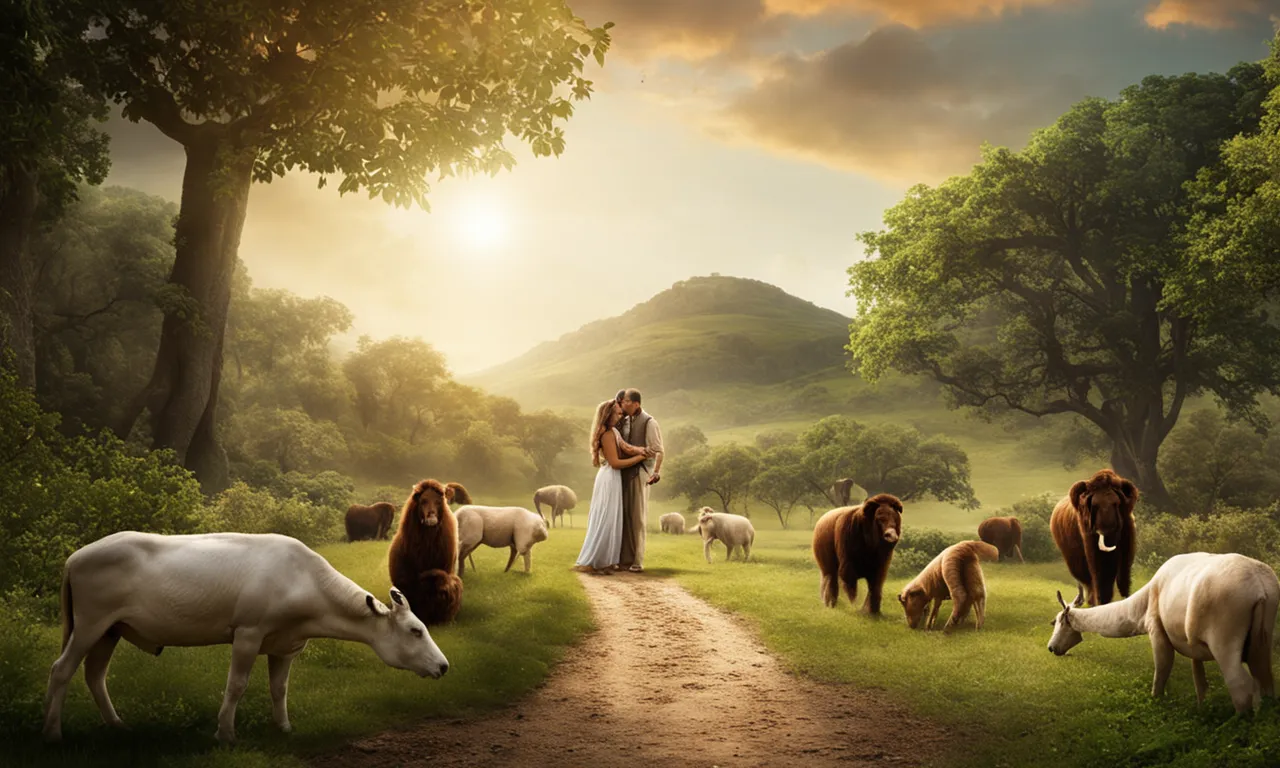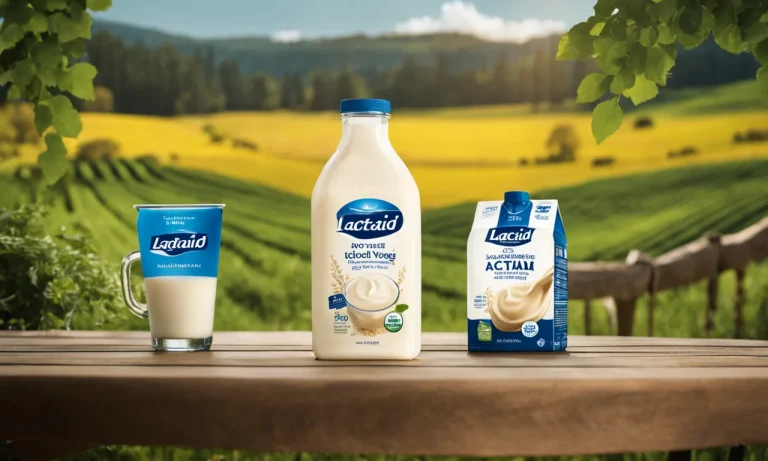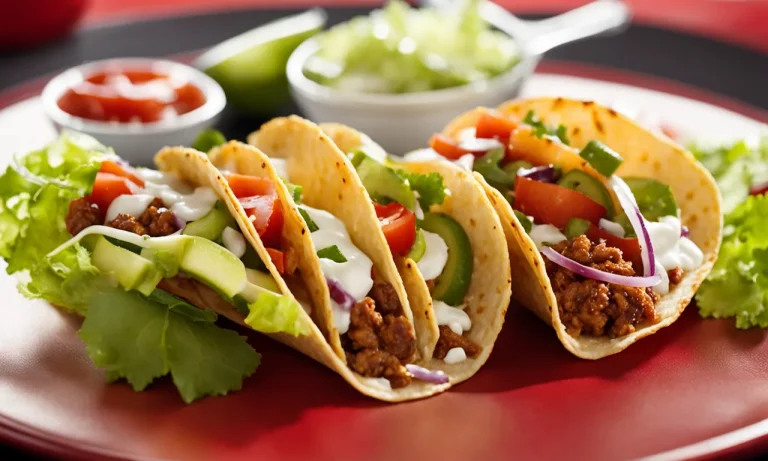Were Adam And Eve Vegan?
The biblical story of Adam and Eve in the Garden of Eden raises many questions for modern readers, including what the first man and woman ate. Was their diet vegan, restricted to only fruits, vegetables, grains and nuts? Or did they consume animal products as well?
This article will examine what the Bible says about the dining habits of humanity’s primal ancestors.
If you’re short on time, here’s the quick answer: The Bible does not explicitly state whether Adam and Eve followed a vegan diet. However, based on the plant-based foods described in Genesis and lack of reference to animal death before the Fall, many believe their diet was vegetarian if not fully vegan.
The State of Eden
When discussing the question of whether Adam and Eve were vegan, it is essential to understand the state of Eden, the idyllic garden where they resided according to biblical accounts. Eden was described as a paradise filled with abundant beauty and tranquility.
Let’s explore some key aspects that shed light on the possible dietary choices of our first ancestors.
Abundance of fruit trees and plants
One of the significant indications that Adam and Eve may have been vegan is the abundance of fruit trees and plants in the Garden of Eden. The biblical account describes this lush garden as a place where every tree was pleasant to the sight and good for food.
It is reasonable to assume that with an abundance of fruits, nuts, and other plant-based foods available, Adam and Eve had no need to consume animal products.
The idea of a plant-based diet being the primary source of sustenance in Eden is further supported by the fact that God specifically instructed Adam and Eve to eat from the fruit-bearing trees in the garden, but not from the tree of knowledge of good and evil.
This suggests that the plant-based foods were intended to be their main source of nourishment.
Peaceful coexistence with animals
Another aspect that supports the notion of Adam and Eve being vegan is the peaceful coexistence they enjoyed with animals in the Garden of Eden. According to the biblical account, Adam was given the task of naming the animals and had a harmonious relationship with them.
This peaceful coexistence implies that animals were not seen as a source of food or harm.
Furthermore, the absence of predatory behavior and violence among animals in the Garden of Eden suggests a natural order where no creature had to kill another for survival. This further supports the idea that Adam and Eve did not consume meat.
No evidence of animal death or meat eating
One compelling argument for Adam and Eve being vegan is the absence of any evidence of animal death or meat eating in the biblical account of Eden. The concept of death and the consumption of animals as food only came into existence after the fall of man, as depicted in the story of Cain and Abel.
Therefore, it can be argued that in the state of Eden, where everything was in perfect harmony, there was no need for Adam and Eve to resort to consuming animals for sustenance.
While there is no definitive answer to the question of whether Adam and Eve were vegan, the state of Eden suggests that a plant-based diet was not only possible but also likely for our first ancestors.
The abundance of fruit trees and plants, the peaceful coexistence with animals, and the absence of evidence of animal death or meat eating all point towards a vegan lifestyle in the garden of Eden.
Inferences About Adam and Eve’s Diet
When it comes to the diet of Adam and Eve, there is much speculation and debate. While there is no definitive answer, we can infer certain things based on the biblical accounts and descriptions of their life in the Garden of Eden.
Fruits of the Garden described as food sources
The Bible describes the Garden of Eden as a place abundant with various fruits and vegetation. In Genesis 1:29, it states, “Behold, I have given you every plant yielding seed that is on the face of all the earth, and every tree with seed in its fruit. You shall have them for food.”
This verse suggests that Adam and Eve’s primary source of sustenance was the fruits and plants found in the garden.
Furthermore, the Book of Genesis mentions specific fruits such as figs, grapes, and pomegranates, which were likely part of their diet. These fruits provide essential nutrients and are rich in antioxidants, which would have contributed to Adam and Eve’s overall health and well-being.
No Scriptural mention of animal-based foods
While the Bible provides detailed accounts of Adam and Eve’s life in the Garden of Eden, there is no explicit mention of them consuming animal-based foods. This absence suggests that their diet did not include meat or any animal products.
Some scholars argue that the absence of animal-based foods in the biblical narrative indicates a vegetarian or even a vegan diet for Adam and Eve. However, it is important to note that the Bible does not explicitly state their dietary restrictions.
Contrast of carnivorous behavior after the Fall
After the Fall, when Adam and Eve were expelled from the Garden of Eden, the narrative takes a dramatic shift. In Genesis 3:21, it mentions God clothing Adam and Eve with garments made from animal skins.
This implies that animals were now being used for their hides, suggesting a shift in human behavior towards carnivorous practices.
From this point on, the Bible records numerous instances of animal sacrifices and the consumption of meat by humans. This change in dietary behavior could be seen as a consequence of the Fall and the introduction of sin into the world.
Supporting Arguments for Vegan Diet
Vegetarian interpretations of the Bible
Many proponents of veganism argue that a plant-based diet aligns with certain interpretations of religious texts, including the Bible. Some scholars suggest that Adam and Eve were originally intended to be vegan, as they were created in a perfect world without the need for animal products.
They believe that the consumption of meat was a result of the fall of humanity and the introduction of sin into the world. Those who support this interpretation often highlight passages such as Genesis 1:29, where God grants humans “every seed-bearing plant on the face of the whole earth and every tree that has fruit with seed in it” for food.
Theology of animal rights
Another argument in favor of a vegan diet is grounded in the theology of animal rights. Some religious thinkers believe that all creatures, including animals, are part of God’s creation and should be treated with respect and compassion.
They argue that consuming animal products goes against this principle, as it involves the exploitation and often cruel treatment of animals. By adopting a vegan lifestyle, these individuals believe they are fulfilling their moral obligation to protect and care for all living beings.
Environmental philosophy against meat eating
Many individuals choose a vegan diet based on environmental considerations. The production of animal products, particularly meat, has been linked to significant environmental issues such as deforestation, water pollution, and greenhouse gas emissions.
Livestock farming requires vast amounts of land, water, and feed, contributing to habitat destruction and biodiversity loss. Additionally, the methane released by livestock is a potent greenhouse gas. By opting for a plant-based diet, proponents argue that individuals can reduce their carbon footprint and contribute to a more sustainable future.
Opposing Perspectives on Omnivorous Diet
When it comes to the question of whether Adam and Eve were vegans or not, there are differing perspectives among scholars and religious communities. Some argue that a literal reading of religious texts supports the idea that Adam and Eve were meant to be herbivores, while others believe that there is no directive against consuming meat.
Additionally, post-Flood accounts of meat consumption further complicate the discussion.
Literal readings of God’s dominion over animals
Those who argue that Adam and Eve were vegans often point to the biblical account of God’s dominion over animals. They interpret this as an indication that humans were initially meant to have a peaceful coexistence with all creatures, and that killing animals for food was not part of God’s original plan.
They emphasize the idea that Adam and Eve were created in a perfect world, where there was no suffering or death.
Lack of directive against eating meat
On the other hand, there are scholars who believe that there is no explicit directive against consuming meat in the biblical narrative. They argue that while God did give Adam and Eve dominion over the animals, this does not necessarily mean that they were prohibited from eating them.
They point out that later biblical passages, such as in Leviticus, provide dietary laws that regulate the consumption of certain animals, suggesting that meat consumption was not inherently forbidden.
Post-Flood accounts of meat consumption
Another aspect to consider is the post-Flood accounts in the Bible, which depict a world in which meat consumption became more prevalent. After the Flood, God gave Noah and his descendants permission to eat meat, indicating a shift in the relationship between humans and animals.
This suggests that the dietary habits of Adam and Eve may have been different from those of later generations.
It is important to note that these perspectives are based on interpretations of religious texts and may vary among different religious traditions. Ultimately, the question of whether Adam and Eve were vegans remains open to interpretation and personal belief.
Conclusion
While the Bible gives no explicit statement on Adam and Eve’s diet, many deduce from the peaceful Eden narrative that humanity started out on a purely plant-based diet prior to the Fall. However, contrasting omnivorous themes in later texts have also given rise to counterarguments.
Ultimately, the question invites speculation, allowing modern readers to project both vegetarian and omnivorous interpretations onto the first chapters of Genesis.







